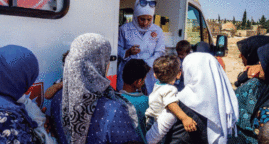An experienced practitioner addresses today’s unprecedented challenges
Article published on American Foreign Service Association website
Kelley Clements, deputy high commissionerfor refugees
FSJ: What is humanitarian diplomacy, and how has its practice evolved since the establishment of the Office of the United Nations High Commissioner for Refugees in 1950?
Kelly T. Clements: From the perspective of the United Nations refugee agency, the UNHCR, the aim of humanitarian diplomacy is to protect, assist and find solutions for refugees, internally displaced persons, stateless persons and other persons of concern to the agency.
Humanitarian diplomacy does not have a clear definition in international law but draws strongly on the principles of independence, neutrality and impartiality. It requires advocacy with governments and engagement with both sovereign states and non-state actors. It involves persuading state and non-state actors to keep borders open to gain access to, protect and assist refugees and to work toward durable solutions.
UNHCR is a non-political humanitarian organization, yet there is nothing about the refugee situations it confronts that is not political in nature. To address both the root causes of refugee movements and immediate threats to their safety, UNHCR engages with political actors in a diplomatically sophisticated manner to gain and maintain the trust of all parties, taking no side other than that of the refugee. Humanitarian diplomacy thus underpins the work of UNHCR.
During my time in the State Department with the Bureau of Population, Refugees, and Migration, humanitarian diplomacy was embraced, trained and practiced by the bureau’s leadership and lean cadre of refugee coordinators. I have found in my short time as deputy high commissioner that the term is not used widely within UNHCR, and does not appear in its statute or in subsequent official policies. Yet the practice of humanitarian diplomacy is essential to the success of UNHCR’s work, and inherent in the daily practice of refugee protection.
Still, the implication of engaging in traditionally political activity is sensitive for us; and humanitarian diplomacy has not been developed into a doctrine or a term of art by the agency. Human brutality and political failures are described in terms of flows, barriers and challenges—dull and technocratic language that, by creating distance and blunting realities, enables the nearly 100 states on the UNHCR’s governing Executive Committee to take decisions on the agency’s budget and policies in a depoliticized atmosphere.
Our sister agency, the International Federation of Red Cross and Red Crescent Societies, has an official definition of humanitarian diplomacy that captures some, but not all, the elements practiced by UNHCR: “Humanitarian diplomacy is persuading decision-makers and opinion leaders to act, at all times, in the interests of vulnerable people, and with full respect for fundamental humanitarian principles.”
Past high commissioners have always had recourse to humanitarian diplomacy—whether in negotiations with world leaders (e.g., High Commissioner Prince Sadruddin Aga Khan’s personal intervention with Canadian Premier Pierre Trudeau in 1972 to take Ugandan refugees), exercising a ‘Good Offices’ role mandated by the secretary-general (e.g., in East Pakistan, now Bangladesh, in 1972) or organizing major solutions-focused conferences (e.g., the International Conference on Refugees and Displaced Persons in Southeast Asia in 1979 and the International Conference on Central American Refugees in 1989). Individual representatives and other staff members—such as the famed, late Sergio Vieira de Mello and many others—have always known that negotiation and persuasion among all parties are the most effective and immediate ways to protect refugees.
In terms of trends, there is today a greater expectation that heads of humanitarian agencies will take a leading role in political arenas and dialogues. At the Security Council, the high commissioner for refugees has a standing invitation to speak. Briefings by the emergency relief coordinator have become an almost monthly engagement, instigated in part by the role of the U.N. Office for the Coordination of Humanitarian Affairs in negotiating Security Council Resolution 2139 on humanitarian access into Syria. Whereas in the past high commissioners might wait to be given particular authorities (e.g., Special Envoys, Good Offices), today a high commissioner is expected to speak out on and advocate for issues affecting refugees and others. These interventions form an important foundation for humanitarian diplomacy.
A more troubling development is the erosion of respect for humanitarian workers on the ground. The sanctity of humanitarian personnel, and the protection previously afforded by their mission, status and visible logos, has deteriorated to the point that in many conflicts, the UNHCR and others are deliberately targeted—usually, but not exclusively, by non-state actors. And whereas violations of diplomatic immunity are relatively rare and are treated with the utmost seriousness, the attacks against humanitarian missions appear to be the “new normal.”
Coupled with national legislation restricting contacts with organizations designated terrorist and other groups, this trend weakens our ability to act impartially, and to be perceived as such. For UNHCR, a non-political actor charged with the global protection of refugees and internally displaced persons, a proven and visible track record of working impartially with all actors for protection, solutions and responsibility-sharing is one of our biggest assets.
UNHCR entered 2016 with unprecedented challenges and an ambitious agenda filled with opportunities to advance humanitarian diplomacy for the more than 60 million forcibly displaced persons in the world today. Mindful of the need to balance the political demands placed upon the high commissioner and the physical threats faced by my colleagues in some of the toughest field operations, I am hopeful the agency will live up to its strategic and comprehensive responsibilities in a spirit that recalls its best diplomatic initiatives of the late 20th century to unlock greater protection for the many we serve. Protection and assistance are Band-Aids in the absence of political and economic solutions to forced displacement.
FSJ: Do you believe that the existing humanitarian infrastructure is able to respond effectively to current challenges? What outcomes would you like to see from the upcoming World Humanitarian Summit in Istanbul?
KTC: UNHCR has often said over the past couple of years that the humanitarian system is “broke, not broken.” Of course, we can do a lot to improve our ways of working and strive for greater efficiency. But the phrase captures something essential—that the humanitarian system suffers from a lack of financial resources to address the scale of emergencies and ever-increasing needs and, more importantly, from the lack of political commitment to solve some of the world’s most intractable problems.
2016 promises to be a decisive year for humanitarian action. It may finally herald a change in the way that the international community responds to humanitarian emergencies by ensuring a development focus from the earliest stages. Practically, this means that refugees are included as economic producers and social assets, not just regarded as passive aid recipients; and that refugees and host communities become part of national development plans and have a voice in aid programs.
In addition to involvement in the World Humanitarian Summit, UNHCR will organize the High-Level Meeting on Global Responsibility-Sharing Through Pathways for Admission of Syrian Refugees in March, co-host a high-level event with the U.K. government and the World Bank on forced displacement and help prepare for two major summits in September: the High-Level Meeting of the Plenary of the United Nations General Assembly on Large Movements of Refugees and Migrants, and the White House summit on refugees. Political attention is clearly being paid to this problem. Let’s hope that it will make concrete action happen to advance humanitarian diplomacy and aid the greatest number of forcibly displaced people in need that the world has seen since the Second World War.
Global leadership to resolve conflicts and displacements is either lacking, or stymied. The events of 2016, including the World Humanitarian Summit can help us all to draw attention to the gravity and scale of the problems, and to come together in a spirit of shared, collective responsibility to address them. I also hope that we can secure commitments by nations and other actors regarding the centrality of protection to all our work, and the need to uphold humanitarian law and standards.
We in UNHCR remain fully committed to doing our part to make our own workings more effective and to collaborate with other humanitarian and development partners—particularly national ones—on common services. We expect a deal to be struck this year between humanitarian organizations and donors, under which we further improve our working methods, and donors loosen earmarking and increase funding.
FSJ: You’ve been involved with humanitarian diplomacy from two different vantage points: first as a practitioner working for the U.S. government, and now as the deputy high commissioner for refugees. Can you compare the two experiences?
KTC: Actually, conducting diplomacy in the humanitarian component of a national government is similar to doing so in a U.N. humanitarian agency, though it is not always perceived in the same light by different parties. We seek to save lives and alleviate suffering according to principles that govern how such aid is provided—according to need, irrespective of political, military or strategic objectives, in an impartial and neutral way.
Both entities work through humanitarian diplomacy to solve problems of protection and lack of access to assistance from various vantage points—strategic (e.g., at the level of the high commissioner or a senior U.S. government official), operational (e.g., UNHCR representatives or State refugee coordinators) and field level (e.g., on specific issues for both national governments and UNHCR, such as cases of refoulement, closed borders, lack of access to refugees in detention or in specific geographic areas).
In addition to defining objectives consistent with the needs of the affected population and the mandate of the home bureau (in this case, State’s PRM), a representative of the U.S. government must also conduct humanitarian diplomacy according to objectives consistent with U.S. government policy. This is not the case for UNHCR, which has a specific mandate enshrined by international law and the U.N. General Assembly.
FSJ: Does the United States conduct humanitarian diplomacy differently than others? How would the rest of the world rate the United States on the effectiveness of its humanitarian diplomacy? What could it be doing better?
KTC: Simply put, protection and assistance are Band-Aids in the absence of political and economic solutions to forced displacement. Humanitarian diplomacy is an essential element to deliver as much aid as possible while other solutions are negotiated (e.g., returns home, local integration, third-country resettlement for a lucky few). Partly as a result of being located in the “foreign ministry,” the U.S. government’s humanitarians are favorably known for bringing a level of political awareness into discussions—this involves an intuitive grasp of the political motives on the part of various actors and the constraints on responders, and the ability to distinguish among positions, bottom lines and interests to come up with well-crafted strategies to address them.
The best thing the United States can do is continue to be UNHCR’s toughest private critic (to make us stronger, more collaborative and more effective) and our strongest public, moral and financial supporter, especially during these days of unprecedented need and complex and seemingly intractable political challenges. This should be done with a clear and appreciable distance between political and humanitarian U.S. government objectives. We count on the United States to continue to press us on our programs, push us to do better, but then use its heft (in moderation) to push for refugee rights and other issues.
FSJ: How can the U.S. Agency for International Development and the Department of State prepare the next generation of practitioners to adequately respond to tomorrow’s challenges?
KTC: In my view, there need to be more USAID and State Department Foreign Service and Civil Service staff exchanges, more cross-training, so that humanitarian and development experts speak the same language. U.S. government humanitarians should be included routinely in overall foreign policymaking, to ensure that the humanitarian implications of proposed diplomatic or military actions are well understood by decision-makers. The U.S. government should second staff members to key international, nongovernmental and civil society organizations (not just humanitarian, but also human rights, peacekeeping, political and security groups) to better appreciate current challenges and prepare for the future.
I base this recommendation on my personal experience, which was heavily influenced by a secondment to UNHCR to serve as a protection officer in Cox’s Bazar, Bangladesh, during the height of the outflow of Rohingya refugees from Myanmar in the early 1990s. There I used tools of humanitarian diplomacy daily to influence camp management in the design of services so as not to prejudice women and children, and I advocated with the government on fundamental protection principles like the right to seek asylum. I have carried those and similar experiences with me through my 25 years as a humanitarian diplomat, and now as U.N. deputy high commissioner for refugees.
Kelly T. Clements joined the Office of the United Nations High Commissioner for Refugees as deputy high commissioner in July 2015. She had worked for the UNHCR in Bangladesh in 1992. Before joining UNHCR, she was involved with refugee and displacement issues as a civil servant in the State Department for 18 years. She was deputy assistant secretary of State in the Bureau of Population, Refugees, and Migration, and earlier led the bureau’s strategic planning, policy development and financial management operations. In 2014, Clements served as acting deputy chief of mission at Embassy Beirut. From 1993 to 1996, she served at the U.S. Permanent Mission to the United Nations in Geneva on a Foreign Service appointment. She was special assistant to the under secretary of State for global affairs (1997-1998), and served as a senior emergency officer for Europe, the Newly Independent States and the Americas, and later as Balkans assistance coordinator; and was deployed to Albania in 1999.
Related Articles
Global Trends
01/09/2017. For nearly two decades, National Intelligence Council’s Global Trends Report has been shaping strategic conversations within and beyond the US Government.
Order of Malta in Hungary scaling up its assistance work to help Syrian population
12/27/2018. After nearly 8 years of war in Syria, the Order of Malta is still present in the region helping the local population with medical and humanitarian activities.
The truth is that Trump has a point about globalisation
09/26/2018. Donald Trump is now the one throwing the petrol bombs and for multilateral organisations like the IMF and World Bank, that poses a much bigger threat.





